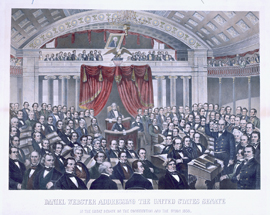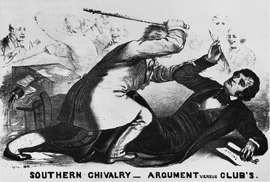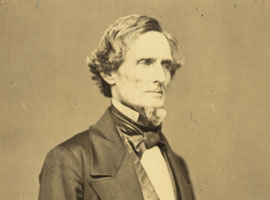in what way did abraham lincolns election further divide the country prior to the civil war?
The Road to War
Conflict and Compromise
Sectional disputes dominated contend during the flow betwixt the Missouri Compromise of 1820 and the Compromise of 1850 and brought to the Chamber a group of talented legislators and powerful orators. In the Senate, where the Constitution established an equality of states, there existed a delicate residue between North and South, slave and free states. For many years, senators crafted legislation designed to resolve exclusive conflicts and avoid secession and civil state of war. In the 1850s, yet, farther efforts at compromise failed. The Senate endured a violent and turbulent decade that propelled the nation to the brink of war.
The rapid expansion of the nation, as settlers moved west and new territories applied for statehood, repeatedly raised the consequence of slavery. The Constitution allowed slavery to exist in u.s.a. but left Congress to decide its status in the territories. The Northern states, having abolished slavery, sought to forbid its spread, while the Southern states, having grown more than dependent on slave labor, asserted the rights of Southerners to transport their way of life into the new territories. In 1820 the Missouri Compromise drew a line beyond the nation at the 36th parallel, above which slavery would be prohibited, and beneath which it could expand. When the state of war with Mexico, from 1846 to 1848, resulted in vast new territories in the southwest, the debate over expansion of slavery was renewed.

In 1850 Senator Henry Clay of Kentucky introduced a packet of compromise measures to save the sectional tensions created by territorial expansion. Aware of the controversial nature of his proposals, Clay urged his colleagues to "beware, to interruption, to reverberate earlier they lend themselves to whatsoever purposes which shall destroy that Marriage." On March 7, 1850, Senator Daniel Webster of Massachusetts rose from his Senate seat and declared: "I wish to speak today, not equally a Massachusetts man, nor every bit a Northern homo, just equally an American . . . I speak today for the preservation of the Marriage." Other senators, about notably John Calhoun of South Carolina, opposed Clay's plan. With Webster's support, and with the assistance of Senator Stephen Douglas of Illinois, Congress passed revised versions of Clay's bills, which became law in September 1850. The Compromise of 1850 admitted California every bit a gratis state, left open the possibility of slavery in the territories of New Mexico and Utah, abolished the slave trade in the District of Columbia, and created a stronger fugitive slave law.
Anxious to build a transcontinental railroad from Chicago to the West Coast, Senator Douglas introduced the Kansas-Nebraska Act of 1854 to organize those territories for statehood. To meet the objections of Southerners who were promoting a southern route for the railroad, the act opened the territories for settlement, but provided that the settlers, through "popular sovereignty," could allow or prohibit slavery. This undermined the 1820 Missouri Compromise and further inflamed the passions in the N and the South. Both slaveholders and abolitionists flooded into the new territories to influence votes on country constitutions. Communities erupted into violence in what became known equally "Bleeding Kansas." Intended to settle exclusive disputes, the Kansas-Nebraska Deed instead brought the nation closer to civil state of war.
In May 1856 Senator Charles Sumner, a fiery abolitionist from Massachusetts, delivered a 5-hr oration in the Senate Chamber entitled "The Law-breaking Against Kansas." Sumner'southward inflammatory spoken language was a harsh indictment of those who supported the spread of slavery and attacked several senators by name, including Andrew Butler of S Carolina. On May 22, 1856, Preston Brooks—a member of the House of Representatives and Senator Butler'south relative—retaliated. After the Senate had adjourned for the day, Brooks approached Sumner at his desk in the Senate Chamber and repeatedly struck him on the head with his heavy walking stick, breaking the wooden cane into pieces. Desperately injured by the attack, Sumner was able to appear in the Senate only intermittently over the side by side iii years, as he slowly recovered. His empty desk-bound became visible evidence that legislative compromise could no longer settle the emotional and divisive upshot of slavery in the territories.

An era in Senate history ended when the Senate held its last session in its venerable old Sleeping accommodation. The rush of states entering the Wedlock had doubled the number of senators and forced them to qualify construction of a new, larger Chamber. On Jan four, 1859, senators marched in procession from the old Chamber—so associated with the Bully Triumvirate of Henry Clay, Daniel Webster, and John Calhoun—to the new Chamber in the Capitol's n wing. In that procession walked men who would soon be leaders of the Spousal relationship and the Confederacy.
Secession
The presidential election of 1860 saw a split in the Democratic Political party between its northern and southern wings, and the rise of the new Republican Party. The northern Democratic senator Stephen Douglas of Illinois ran against a southern Democrat, Vice President John C. Breckinridge of Kentucky, and against the Republican candidate, Abraham Lincoln, whom Douglas had defeated for a Senate seat only two years earlier. A 4th candidate, onetime Whig senator John Bell of Tennessee, ran as the Constitutional Union candidate. In this divided field, Lincoln won the election on Nov vi, 1860. 4 days later, Senator James Chesnut of South Carolina resigned his Senate seat. Although no state had notwithstanding seceded from the Union, rumors of secession were heard everywhere. Chesnut "burned his bridges" in the Senate, noted his wife Mary, and returned to South Carolina to draft an ordinance of secession and attend the offset Amalgamated Congress. The side by side day, his swain South Carolinian, Senator James Hammond, submitted his ain resignation and turned his attention to establishing the Confederacy, which he pledged to support "with all the forcefulness I have." On Dec 20 South Carolina voted to secede from the Union, followed by another 10 states over the adjacent six months.
The calendar month of January 1861 proved to be particularly painful for the Senate. On January 9 Mississippi became the second state to secede. This action prompted Senator Jefferson Davis to address the Senate on January 10, imploring his colleagues to let for peaceful secession of the Southern states. "If y'all desire at this last moment to avert ceremonious state of war, so exist information technology," Davis proclaimed. "If you will not have information technology thus . . . then, gentlemen of the Due north, a state of war is to exist inaugurated the like of which men accept non seen. . . ." On January 21, as a packed and tearful gallery of spectators watched, Davis bid farewell to the Senate. In his final accost, he warned that interference with Southern secession would be disastrous.

I am sure I feel no hostility to you, Senators from the N. I am sure there is not one of you lot, whatever sharp word in that location may have been between usa, to whom I cannot now say, in the presence of my God, I wish you well . . . . I hope . . . for peaceful relations with yous, though we must role. . . . The reverse may bring disaster on every portion of the state . . . . Mr. President, and Senators, having fabricated the announcement which the occasion seemed to me to require, information technology merely remains for me to bid you a final farewell.
On Feb 18 Davis became president of the Confederate States of America. Past that fourth dimension, 7 of the 11 Confederate states had already seceded. (Tennessee became the last to withdraw, on June 8, 1861.) When crowds gathered at the Capitol on March 4, 1861, to witness Lincoln'south first inauguration, the nation was already divided and preparing for war.
During the months betwixt Lincoln's ballot and his inauguration, many members of Congress clung to the hope of reconciliation. Kentucky senator John J. Crittenden led a last-ditch effort at compromise, proposing to extend to the Pacific Bounding main the line established past the 1820 Missouri Compromise. The proposal failed. Senator Charles Sumner dismissed such compromise efforts every bit a misreading of the secession movement, "deeming it merely political & governed by the laws of such movements, to be met past reason, past concession, & by compromise; whereas information technology is a revolution."
Adapted from The Senate'southward Civil War. Senate Historical Function. Washington, D.C.: Government Printing Office, 2011.
Source: https://www.senate.gov/artandhistory/history/common/civil_war/RoadtoWar.htm
Post a Comment for "in what way did abraham lincolns election further divide the country prior to the civil war?"